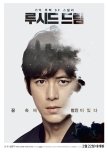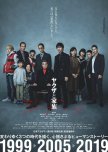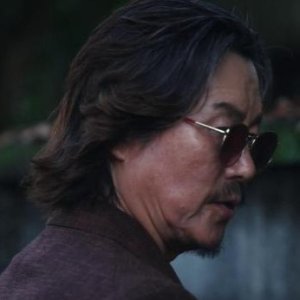
This review may contain spoilers
Lucid childhood dream
Realized by Joon-sung Kim by following coincidentally a childhood dream of his, 『Lucid Dream』 (루시드 드림) follows journalist Dae-ho Choi, whose specialty is revealing big fish's misconduct, as he tries to get back his son who was kidnapped during a family outing in an amusement park. Helped by benevolent people touched by his determination, our protagonist will use not less than, as the title mentions, lucid dreams for finding his child again: an audacious artistic attempt that'll have trouble blooming, just like other elements of this particularly oneiric adventure.And precisely, the main problem is that oneiric part, that is really over-the-top. In themselves, lucid dreams are not a problem, and basing a movie on them is rare and cool; but being able to visualize pieces of memories as lucid dreams and then to analyze them as the fancy takes one? Without mentioning the concept of shared dreams… Admittedly, the movie makes use of its science-fiction label; but sci-fi, because of its science part, has to be duly justified for one to accept to believe in it. You can't make rules out of nowhere; and the rules you set up have to be backed up if you want them to be *science* and not just *fiction*.
Speaking of fiction, the plot has noticeable loopholes. That technology for solving cold cases is incredibly efficient! so why isn't Detective Song or the police as a whole more interested in using it? Also, how can this expensive technology be so easily used by complete strangers? if at least there'd be a small sentence saying « okay, i'll use it for my research and get the funds from that », that'd make it more believable. This is the kind of details that lack but are crucial for the story elements to hold up. In addition, at the end of the movie, many points remain unsolved: what has happened to the cool disabled guy? to the chad support detective? to Detective Song?
In the same vein, the story is rather predictable. We know the father is gonna find his son, we know his son won't die, we know that himself won't die. There's no suspense. Okay, we feel surprised that the villain was actually Detective Song — but his way of thinking is weird and hard to comprehend, especially for someone supposedly as clever as a detective: how will he explain to his daughter that she survived? how will she grow up knowing her heart comes from a little boy?
But to be fair, if we put all of that aside, the movie is able to distract one neatly up till the end.
That is notably thanks to the characters, which are pretty good and well played by their actors. The only problem about the characters, is that the most interesting ones are the secondary characters: each of them is specialized in a given domain, has out-of-the-ordinary skills, and some unique or quirky personality. While the main character is really just a father chasing his son with no other personality than that… if only his past of journalist would have been more valued!
What's even sadder is that among those characters there are some renowned actors: Soo Go for the father, or the celebrated Kyung-gu Sul, who in the same year demonstrated a brilliant performance as a Korean mafioso in 『The Merciless』… For both, their performance in Kim's movie is lacking.
From another side, I noticed something particular about this movie. Several times, it reminded me of manga: manga also offers a lot of exaggeration and impossible fiction like the shared dreams, or the fact that the hero is determined, or that he meets a lot of new friends each of them having particular skills, being particularly friendly, having strong personality to the verge of eccentricity, having their own locations that look impossible to exist but you are amazed in front of them (like for real, this disabled guy's base is pretty cool)
For real, i'm pretty sure the movie would make a cool manga/manwha/comics
Finally, as for the soundtrack, it is forgettable (and i forgot it for that matter), as well as the scenery — except for one scene at the end of the movie, where we get to see a devastated city as the final glimpse someone has before dying: having delivered a nice view of what that moment could look like, we get there to see genuine artistic thought in motion, for which we can salute artistic director In-jun Hwang for his work.
All in all, 『Lucid Dream』 is quite the mainstream movie: we know where we'll arrive and few are the elements that'll surprise us. The core of the scenario is appealing, but badly implemented, as are the story, the plot and the characters to some extent — and that's too bad considering the movie's cast. But hey, if we fill just a bit the plot holes, the movie will surely make a very good manga (or rather manwha here): waiting for that now :ok:
Was this review helpful to you?

This review may contain spoilers
The axe ought to be sharpened
Take a fairy tale, turn it into a novel and then into a movie: here you have the recipe for Takahashi Miike (崇史 三池)'s movie 『怪物の木こり』. Adapted from Mayusuke Kurai (眉介 倉井)'s novel of the same name, and englishly renamed 『Lumberjack the Monster』 for English audiences and beyond, this movie aired first in October 2023 tells the story of a serial-killer who follows the path of a fairy tale character. Through a thrilling story, the movies takes you to a travel where you'll remember what it means to feels something, though with a handful of poor handling here and there.Let's begin with the story. It is in itself pretty cool, albeit a bit too over-the-top. You have several children who were kidnapped and underwent surgery for implanting them neurochips… and one day someone decided to kill them all, because all of those children became psychopaths following their operation.
ngl, i was surprised by who was the real serial-killer, although there were too many hints given as the end was getting closer. But the real surprise was the end of the movie, which is imo the best part of the movie, as it makes you ponder on the idea of redeeming and the costs of your actions.
On the contrary of that end, the characters feel a bit cliché, or should i say stereotypical: the protagonist who is lacking emotions and ends up retrieving them, the big brain forensic, the old-timer, the gentle villain motivated by a superior goal… all common tropes in Japanese works. Also common is that only the MC and the villain evolve, which makes the other characters lack depth. It also doesn't help that some actors don't play so well: but to be fair, as a review made by The Arts Fuse magazine puts it, « what can you do with a role and a story this clichéd? ».
In addition of the characters and their actors, the dialogs feel somewhat dull. As much as they don't feel "artificial" per se, they do strongly feel fictional: like, you wouldn't hear that IRL. I'm thinking here especially to one of the last scenes where Akira and Takeshi speak together, and they begin to philosophize about emotions and life: this is such a Japanese way of handling dialogs, so dramatical, but so unrealistic (especially when not done correctly)!
That being said, I have to admit that this kind of philosophical pondering makes in itself the work more interesting, as it gives it a supplementary literary value and elevates the work beyond itself, so to speak.
Continuing with meh aspects, the pacing isn't great. Those aforementioned dialogs are often too long, whereas the scenes between each of the dialog are too short. It all makes more sense considering the movie is an adaptation of a novel: you really feel that this novel — or at least that adaptation — put emphasis on its dialogs more than the scenes between them. But here it feels just like one jumps from a dialog to another. And considering that most of the time the camera doesn't move a lot and/or uses uninteresting angles, the scenes sorely lack dynamic.
Also about the scenes, the setting and scenery aren't so innovative. Unrelated parts of a city and an old abandoned mansion of horrors: those two hardly feel connected, and as much as it's understandable from the point of view of the story, they could have created decorations that'd convey a connection better, and also that have more personality. It works enough, not gonna lie; but in addition of the aforementioned other bland parts, it doesn't help.
What wasn't bland was the gore: my gosh, Miike really likes his flows of blood! even if they are REALLY exaggerated lmao; but they weren't so frequent, so that it gives an interesting startling touch when they appear.
All in all, 『怪物の木こり』 is not bad, and its story and the philosophy at the end make it worth watching; but the various lacking elements pull down the overall quality.
It's my first movie from Miike, who i heard is well-known for his handling of the horror genre; i'll try to look into that part of his filmography next.
Was this review helpful to you?

This review may contain spoilers
classic and romantic, realistic and tragic
With a recurring sight of an industrial chimney amidst a coastal town, Michihito Fujii's movie about yakuza and family, aired first in 2020 in Taipei, offers us a nice view on Japanese society: both romanticized and realistic, with not-so-good characters but good technique.Starting concretely after an introductory first time period of more than 20 minutes of screen time (!), the movie offers a quite amusing, if not weird contrast for depicting yakuza. While they are pretty much shown as heroes in the second time period of the movie, carefree and admired by the population, they become total outcasts in the third time period. This evolution from a romanticized view to a realistic one feels a bit too astounding: I'd guess that Fujii wanted first to show the classic romantic view on yakuza in said second period to enter into the usual trope of the genre, before moving on to the newer realistic approach of its third phase — an understandable choice, that could have been more well performed nonetheless.
That being said, it is really for that third period that the movie shines. Recently, due to a series of laws passed in the 2010s, the yakuza world has been waning in Japan. Despite this, the world of art and entertainment still prefers to continue showing us badass and cool yakuzas. The view captured here by Fujii is not only realistic: it is also real at all. Today, being a yakuza is not fun, nor enjoyable, nor even a concretely possible life to lead: as one would stop being one, one would face strong ostracism for a rough 5 years, to the extent of losing one's friends, peers and even family, while struggling for even getting a cellphone. The Japanese society, highly cohesive, doesn't play around when it comes to dealing with outcasts. For that point, I found that the movie used very neatly the fact it was changing time periods: thus for the last one in 2019 that showcased the appearance of social networks and their astounding speed and strength for spreading quickly a small piece of information like a picture.
For that matter, the movie also shows some other interesting societal aspects. The most obvious is how the police is corrupted to the core and tied with the yakuza and their affairs: it's not by chance that the yakuza were so deeply rooted in Japanese society before. More interestingly, the movie asks the real question of how to deal with former criminals after they have served their prison sentence and their reintegration into society.
As its title shows by mentioning the word twice in Japanese and in English, the movie especially insists on the theme of family: its main character hasn't gotten the opportunity to grow within one, and has been longing for it — even if that were to be yakuzas, even if it would mean losing them quickly. As such, the movie shows that one can long for loved ones, be them related by blood or not, and that at all costs.
Sadly, Fujii's characters aren't so well written, nor is their development. Because of this, we don't clearly understand how Yuka fell in love with Kenji, nor how far Shibasaki played a father figure for Kenji. This lack of character development is a pity, because it would have elevated the movie a lot. Next to that though, Fujii tells his narration through clues and not just simple lines of text (like for Kenji's dad's fate), which is quite pleasant.
Otherwise, the movie uses interesting techniques throughout, most notably for the camera and the image. The camera's motion differs depending on the scene: it can as much shake (maybe too much though), reflecting Kenji's mind wandering, or being steady when it wants to engraves a scene. There was a very nice scene where the camera, literally a passenger in a car, was accompanying the viewer all along. As for the image, its overall aspect changes depending on the period, gradually becoming forlorn, darker in color and light as we move further in time.
Despite its flaws, I personally loved this movie, and would recommend it for its portrayal both romantic and realistic of yakuza, and of Japanese society as a whole. If it can fail to grasp the viewer's interest in its first segment, the tragical turn it takes in the second segment is striking and definitely worth watching.
Was this review helpful to you?

This review may contain spoilers
Pursuing genuineness
Injustice: this threat that plans overhangs us all and strikes ruthlessly on some. And when it happens, we always have the choice between either consenting to its fateful sentence, or declining it and attempting to set the record straight.That is 『Shoutai』's central issue: main character Keiichi Kaburagi, sentenced to death because of human carelessness for a crime he never committed, seeking truth in a race — or rather chase — against the clock. Thus showing humanity under its bad aspects, the movies does it too in a good light: naturally through Keiichi but also through the other characters, whose actors display neat performances. A narrative problem however lies with KK, who possesses way too many skills considering his education and displays such incredible kindness that his innocence is almost instantly recognized by the people he meets along his journey. But that facet is probably due to the inherent Christian thread of the movie: the MC not only comes from a Christian orphanage, he also is a kind of metaphor of Jesus, who was also condemned to death but still converted the people around him while believing in the good of this world (as Kaburagi says himself). That is well portrayed through an enthralling storytelling split in clearly identified chapters, through which we run successively with a mundane OST but a thrilling tension, a clever camera and even well-crafted special effects.
Coming from a novel with a first adaptation as a series in 2022, 『Shoutai』 makes good use of the medium of cinema narrate its story. The end might be predictable, but the piece of work does convey its critic of death sentence, along with a reflection on identity (as its Japanese title entails): our real identity (*shoutai*) may be defined by others, we alone carry it.
Was this review helpful to you?

This review may contain spoilers
Chasing the thrill
If on one hand Netflix raises the prices of its subscriptions, on the other it doesn't swindle us concerning the productions that it funds or puts on its platform — as opposed to 『Jimenshitachi』 (English title: 『Tokyo Swindlers』), Hitoshi Ohne's new series aired in 2024 about authentic scams in the real estate sector.Based upon real facts, 『Jimenshitachi』 follows the story of a team of professional swindlers (hence the English name of the series) who will be searching ever sweeter deals through their leader's fantasized —if not sexual— drive; and the viewer will follow with pleasure the drawing up of their deals and the difficulties they'll meet to achieve their ends.
The series thus slots in an original manner into the scam affairs that Asian series so regularly portray: whereas one often meets the heavily indebted victims of those scams, one lingers here rather on the other side of the curtain over the drafting of those scams, all the more so in a more original sector (namely the real estate one) than the usual ones that are gambling games and fraudulent loans. I shall however mention a problem that has bothered me all the way through my watching: the Jimenshitachi team seems to be the only one that exists in this universe. Although the opening does mention other cases having occured for many years, and although the dark world of real estate is often brought up and even appears many times, the only fraudsters cracking the whip on-screen and on which the police will investigate shall forever be linked to Harrison… so that the universe inevitably lacks depth, even though it creates a history of the previous cases going back several years prior to the main events of the series.
In that vein, one will also be in one's depth with the characters. If these are all endearing and played by a handful of experienced actors (Etsushi Toyokawa as Yamanaka Harrison, Go Ayano as Takumi Tsujimoto, Pierre Taki as Goto…), they all are also pretty shallow depending on their rank in the series. The leader Yamanaka Harrison does a very good embodiment of the hunter who loves to run after their prey and see it suffer in its last moments —metaphor weaved and traced literally from the beginning to the end of the series— and who will always tell us with a certain mischievous pleasure his philosophical thoughts nourished by glasses of top-of-the-range whiskey: but otherwise? What is he aside from that, where does he come from? does he really only live for his scams? Similarly, the other main character Takumi defines himself only in relation to his past; that is, only in relation to the series' synopsis. As for the other characters, they are as neglected as can possibly be, simply being present during the scams; but they all bear enough character to be likeable and even eagerly-awaited at each appearance. The treatment is slightly different with the detectives, who get a bit more details about their lives to the point of saddening us when one of them dies: proof of the formidable interest there is to develop one's characters.
Despite the aforementioned flaws, broadly speaking, director Ohne succeeds with brio to keep the viewer on tenterhooks and to maintain a constant tension, playing with different genres at the same time: the thriller, the spy and even the action one to an extent. Conscientious shots add to the thorough directing, some of them being particularly well orchestrated; in particular, efforts were made during the most tense moments like the death of some important characters, or during certain sequences that include more spectacular scenes having then been computer-realized (which doesn't make them always so convincing though). Last but not least, the soundtrack is also, for a change, delectable and memorable. Signed by the well-established artist in the electro and techno genres Takkyu Ishino (whose associate in the Denki Groove band is no other than Pierre Taki mentioned above), its tones correspond perfectly to the tense ambience and the contemporary atmosphere of artificiality of the series.
To conclude by extending the metaphor of the hunt; if you are seeking an original Japanese series without pretension, look no further: 『Jimenshitachi』 will be able to satisfy for a good load of hours your craving, after which you'll be ready to set off again in pursuit of a bigger —and maybe riskier?— prey.
Was this review helpful to you?

This review may contain spoilers
Absolution through penalty
Punishing the evil baddies is cool, but old-fashioned in itself: what about exposing their inner evil by skinning them? That's basically the idea behind 『Smoking』 (original Japanese title 『スモーキング』 is the same), which the producers of the series, very productive and familiar with every genre, execute quite well.Through a sort of exploration of the Japanese organized crime world and its sprawling links (not to the level of 『Yakuza and the Family』 though), that series produced by Netflix and aired in 2018 presents a 4-member gang accomplishing justice by attacking villains and revealing the demons they are by skinning the skin of their tattooed back and putting it in a big glass jar: a sophisticated trophy that everyone would wish to display it in their living room, and a philosophical message in itself: our skin is just a mere disguise that in some cases hides real monsters. It is gang chief's mission to reveal this truthful fact to the world, and the others' somewhat resolve to accompany him, for corruptible civil justice wasn't able to act in their favor.
Bloody is the operation undergone by the baddies, but always satisfactory to watch — and not gratuitous, as the Smoking Gang has morals. Best instance, they recognize and accept redemption when sincere — like for the Smokers themselves, which in addition doesn't gain much from their hunts and accept to live in poverty, likely for not falling into the iniquity they fight.
Their characters all have hidden pasts that they fatefully confront at some point. It is not so dense, but contains enough of a backstory to make their holders likeable — something that the performance of the actors also bring well. I personally loved the acting of the cool laid-back justicer of Haccho played by Nobuaki Kaneko, and also to a certain extent that of the old and wise Sabe played by Ryo Ishibashi 🙏
As often in this kind of production, the soundtrack is pretty forgettable — well except for the ending song that's still ringing in my ears, though in a bad fashion: I've been wondering each time why they'd have chosen a pop rap song that doesn't fit the Robin Hoodish crime vibe of the series. Maybe because it does fit the mainstream 18+ public the series aims for, admittedly; which is also the reason why deviances and cruelty are never so brutal or explicitly shown. In that vein, the series also ends with a rather open ending in case they would want to make the flame smoke more 🚬
Nothing aesthetically revolutionary, 『Smoking』 is a series that is worth watching for killing time while making contact with the limits of humanity: it's cooking well, and smoking good enough.
Was this review helpful to you?






